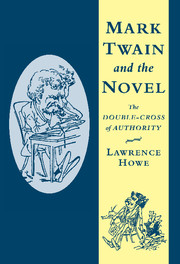Book contents
- Frontmatter
- Contents
- Acknowledgments
- List of abbreviations
- Introduction: Bearing the Double-Cross
- 1 Mark Twain's Big Two-Hearted River Text: “Old Times on the Mississippi” and Life on the Mississippi
- 2 Catching Mark Twain's Drift: The Adventures of Tom Sawyer and Adventures of Huckleberry Finn
- 3 Reinventing and Circumventing History: The Prince and the Pauper and A Connecticut Yankee in King Arthur's Court
- 4 Twaining Is Everything: The American Claimant and Pudd'nhead Wilson
- Epilogue: After the Double-Cross
- Notes
- Index
4 - Twaining Is Everything: The American Claimant and Pudd'nhead Wilson
Published online by Cambridge University Press: 05 September 2012
- Frontmatter
- Contents
- Acknowledgments
- List of abbreviations
- Introduction: Bearing the Double-Cross
- 1 Mark Twain's Big Two-Hearted River Text: “Old Times on the Mississippi” and Life on the Mississippi
- 2 Catching Mark Twain's Drift: The Adventures of Tom Sawyer and Adventures of Huckleberry Finn
- 3 Reinventing and Circumventing History: The Prince and the Pauper and A Connecticut Yankee in King Arthur's Court
- 4 Twaining Is Everything: The American Claimant and Pudd'nhead Wilson
- Epilogue: After the Double-Cross
- Notes
- Index
Summary
The law is usually supposed to be a stern mistress, not to be lightly wooed, and yielding only to the most ardent pursuit. But even law, like love, sits more easily on some natures than on others.
Paul Laurence Dunbar, “The Scapegoat”Like Hank Morgan, Mark Twain returned to the nineteenth century in the aftermath of A Connecticut Yankee. Beyond returning to a familiar era and the familiar geography of the United States, he also returned to the character Colonel Mulberry Sellers, whose hare-brained scheming and good-natured idiocies had helped initiate Twain's first attempt at book-length narrative fiction in partnership with Charles Dudley Warner. Sellers was the only element of The Gilded Age that continued to occupy Twain's imagination. John T. Raymond's successful portrayal of Sellers in a stage adaptation had reinvigorated Twain's interest in writing a sequel featuring the madcap opportunist. But the play entitled Colonel Sellers as a Scientist, which Twain wrote in collaboration with Howells in 1883, lay dormant because Howells was embarrassed by the farce. In 1884, around the same time that the initial idea for A Connecticut Yankee emerged, Twain decided to convert the Sellers play into a novel. But with A Connecticut Yankee absorbing his literary energy during the 1880s, he didn't get around to this conversion until 1891.
After betting on the subversive critical energy of the novel against the authority of history in A Connecticut Yankee and losing, Twain found the Sellers farce an attractive mode. He mustered a desperate and cynical stand in this last complete dialectical stage.
- Type
- Chapter
- Information
- Mark Twain and the NovelThe Double-Cross of Authority, pp. 174 - 222Publisher: Cambridge University PressPrint publication year: 1998

